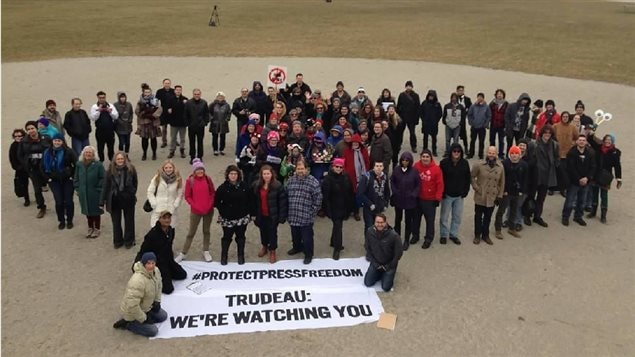
Most Canadians would probably think that the widespread concept of protection for a journalist’s confidential sources exists here in Canada, as an integral part of the larger concept of “freedom of the press”.
It doesn’t.
For years, journalist organisations in Canada have been lobbying to get that official protection, press freedom, which they argue is needed in a democratic society.
A major advance is achieving that protection has finally been achieved.
Tom Henheffer is the executive director of the non-profit advocacy group Canadian Journalists for Free Expression (CJFE).
Listen
The protection Canadian journalists have long sought is now to a large extent accomplished with Bill S-231 ”An Act to amend the Canada Evidence Act and the Criminal Code: protection of journalistic sources”, or more simply, the Journalistic Sources Protection Act.
Although not coming into effect until achieving Royal Assent, it has passed the House of Commons and will be the law.
Henheffer says, “This bill is the beginning of full legal recognition for the role that journalists play in serving the public and protecting democracy.”
The law was instigated after a major scandal when it was revealed that police had been monitoring journalist mobile phones to obtain information on their sources.
The warrants to allow police to do this had been signed by a Justice of the Peace, a legal position but one that is politically appointed and for which it is not even a requirement to have a law degree.

Under the new law, a Superior Court judge will now have to sign such warrants, and the justifications for them which be much more strict.
Henheffer says because of the revelations of police tapping of phones, many journalists had told him their confidential sources would no longer speak to them out of fear of reprisals ranging from potential job loss, to potential death threats.
The new law will allow Canadian journalists to refuse disclosure of information or documents that identify or are likely to identify a journalistic source. This condition will apply in all cases unless the information or document cannot be obtained by any other reasonable means and the public interest (for example, an exigent security situation) outweighs the public interest in preserving the source’s confidentiality.
The bill also reverses the burden of proof from a journalist arguments defending privacy, to the requesting party’s having to prove the need.
While the CJFE says this is a major step in press freedom, there are still modifications needed such as expanding the definition of journalist to include the modern phenomenon of bloggers, and to include protection for sources that are not “anonymous”.
The CJFE says reliance on confidential sources is a recognized practice by journalists to provide information to a democratic society.